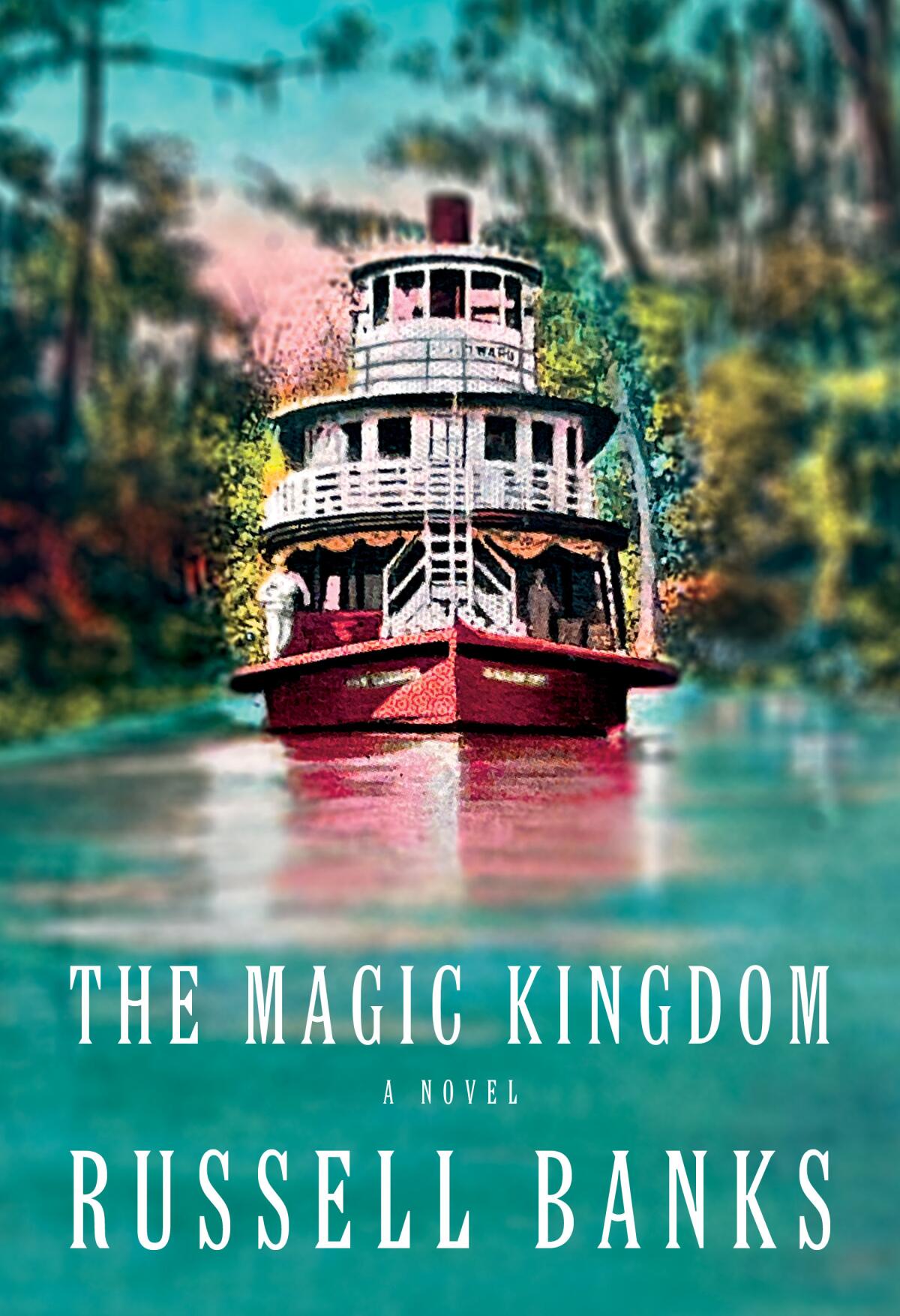Review: In Russell Banks’ new novel, Florida is our bellwether (and not in a good way)

- Share via
On the Shelf
The Magic Kingdom
By Russell Banks
If you buy books linked on our site, The Times may earn a commission from Bookshop.org, whose fees support independent bookstores.
“Florida from its beginnings has served as a catch basin for the world’s detritus,” writes Russell Banks in his 14th novel, “The Magic Kingdom.” “It’s where you go when your prospects elsewhere have ended.”
The person saying that is a retired real-estate investor named Harley Mann, the latest in a string of troubled Florida men who have populated Banks’ oeuvre. His 1985 masterpiece, “Continental Drift,” turned on a flat-broke family man who stumbles into human trafficking in the Sunshine State; the protagonist of 2011’s “Lost Memory of Skin” is a convicted sex offender living under a Florida overpass. Harley isn’t quite so troubled — he’s made his fortune, reached his 80s — but as with the sinkholes he keeps referencing, something is crumbling underneath. And though “Kingdom” doesn’t have the harrowing force of Banks’ finest novels, including “Drift” and 1989’s “Affliction,” it’s an engrossing morality tale.
Harley, we learn early on, is a product of American ideology, though the ideology keeps changing. His parents were Ruskinites, a short-lived group of 19th century utopian socialists. When Harley’s father dies, his mother and siblings stumble into a post-Civil War plantation suffused with violence and cruelty. (A young Harley witnesses a drunk man meet his end on a table saw.) Better prospects arrive when the family finally moves to New Bethany, a Shaker colony near Orlando, at the turn of the 20th century.
In Lauren Groff’s second story collection, the dark and engrossing “Florida,” the title state is almost always home to bad news.
In Banks’ framing, Harley is recalling all this toward the end of his life in 1971 after selling off his land to Disney executives planning out Walt Disney World. (The implication is that Shakerism has been supplanted by yet another iffy ideology, capitalism.) He’s not writing this out but speaking it on a set of reel-to-reel tapes, the better for Banks to suggest that Harley is literally a lonely voice. He’s also a bit off. His experience at New Bethany as a teenager plainly made him obsessive and slightly warped — he maintains a scale model of the colony in his home and hints at the terrible story he has to share but keeps withholding the details. It is “a place that I regard as the opening wound in a wounded life,” the site of “an awful, unforgivable betrayal” and home to “the cause of untold catastrophic loss and pain.”

Enough already: It was a place with a girl. Teenage Harley diligently works to be an “ideal Shaker boy” — celibate, community-focused, distant from the cares and chaos of the outside world (spelled with a capital W). But he also can’t keep his eyes off Sadie, a young woman who regularly visits New Bethany as a respite from the sanitarium where she’s being treated for tuberculosis. He’s determined to mind his own business on the colony — more specifically, the beehives, which he pointedly notes are “like a whole city in miniature.” But attraction has a way of messing with good Shaker ideals. The colony’s leader, Elder John, spends a jealousy-inspiring amount of time with Sadie, and Harley is learning as much about hypocrisy as he is about love or lust.
To Banks’ credit, the mess that ensues is more complex than a matter of forbidden love. Indeed, the kind of plot mechanics that might make this a romance are largely absent; the elements that make Sadie attractive, or even much of a character, aren’t fleshed out. Instead, Banks is more interested in the philosophical questions sparked by Harley and Sadie’s connection. Can any ideology survive under the weight of our clumsy humanity? Does a belief system temper our individual greed or stoke it? How much of our judgment of others’ shortcomings is a way of ignoring our own? Is the law equipped to handle morality, especially in the face of power?
“The Magic Kingdom” is Harley’s story, but it turns on a line by Elder John, a former convict who casts his own suspicion on ideology. “You either surrender your freedom to the system, or you walk away from it,” he tells Harley. OK, but walk where?
This article was originally on a blog post platform and may be missing photos, graphics or links.
Though Banks is dealing with big-picture, allegorical stuff — Harley Mann’s last name is clue enough of that — the novel isn’t airless. Dramatic, almost biblical events abound: enslavement, panthers, sinkholes, fires and other Job-worthy catastrophes. As ever, Banks writes gorgeously about the state’s natural wonders, pointing out the strange magnetism a place needs to have to attract the world’s detritus: “The lake was smooth, and the low mangroves and palmettoes that marked the distant shore were sharply etched against the bright blue cloudless sky.”
Yet Florida’s strangest and most charismatic specimens are its people, from Elder John, with his rhyming lectures about proper table manners, to his acquaintance Cyrus Teed, a real-life crackpot who promoted the idea that “the Earth was hollow, and it contained within it the entire universe.” That ideology never took off; nobody wants to imagine living in a world where we’re so close to everything and everyone.
Harley was inspired to record his narrative after the arrival of “Mr. Walt Disney’s vast enterprise up there southwest of Orlando.” But Banks is writing with an eye to the present, as ideological clashes consume the current discourse. For this, the author offers no reassurance: Betrayal and collapse are as much a part of the American story as faith and fortune. Florida is home to a special brand of sinkhole, where a “herd of cattle could suddenly get swallowed by the earth.” But sinkholes of all kinds are everywhere.
The latest from Ling Ma, Yiyun Li, Russell Banks and Namwali Serpell as well as exciting newcomers round out our critics’ most anticipated fall books.
Athitakis is a writer in Phoenix and author of “The New Midwest.”
More to Read
Sign up for our Book Club newsletter
Get the latest news, events and more from the Los Angeles Times Book Club, and help us get L.A. reading and talking.
You may occasionally receive promotional content from the Los Angeles Times.









